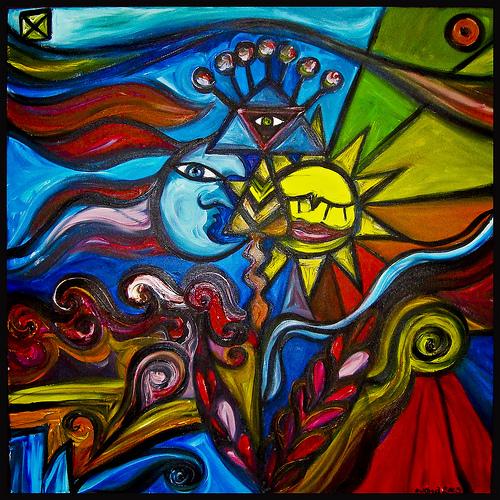Being and Doing: Integrating Masculine and Feminine Energies
In our patriarchal, achievement-oriented society, there is an imbalance of masculine energy – a focus on doing, rather than being. We are overly concerned with how productive we are, our achievements, and our careers. My Asian neighbour expressed his dislike of the North American small talk question of “So what do you do, or what do you do for work?”, and how it limits our focus on one aspect of ourselves. Instead, he prefers the more open question of “What is great in your life?”, which invites a response of almost anything, “I love being a mother”, “I’m learning to play piano”, “I’m excited about a new relationship”, etc. It allows for sharing and connecting with so many more aspects of ourselves.
masculine and feminine energy
Masculine energy is about doing, it’s action-oriented, whereas feminine energy is about being, and creative intuition. In the tantric world, the moon is associated with feminine energy, cooling quality, the color white, the element of water, and the intuitive processes. The sun is associated with masculine energy, heat, the color red, the element of fire, and intellect. Masculine traits include logic, action, science, linear, straight, and beauty in the rugged sense. Feminine traits include, intuitive, round, still, no movement, creative, womblike, nurturing, and beauty in the rounded sense. We all have masculine and feminine qualities within ourselves. These qualities can be well integrated, or out of balance. View our therapy page
What is masculine energy? What is feminine energy?
According to Carl Jung, males have unconscious feminine qualities, anima, and females have unconscious masculine qualities, animus. The animus when it is integrated in a healthy female psyche would typically imbue the following qualities: Good rational and logical ability; ability for clear, non-attached thought; ability to construct by sustained effort and application; a strong centre; good external strength in the persona; bridge to knowledge and creative thought; problem solving. When the animus is displaced or overwhelms the female psyche it may exhibit some of the following symptoms: know it all behaviour; bullying; sadism; controlling; loud; inability to effectively and meaningfully relate. A well integrated anima in a healthy male psyche would display as follows: self soothing, self nurturing and self loving; access to creative inspiration; strong centre and contained inner life; capable of empathy; able to make value judgements beyond the realm of pure rationality; access to feeling life; good relatedness; happy , wholeness , oneness , harmony and bliss. Some typical symptoms of the displaced or overwhelming anima are: uncontained, constantly seeking external affirmation; lack of creativity; moody; bitchy; poor relatedness, behaviour in relationships designed to isolate the person from others; masochistic; greedy, grasping; self-centered.
Feminine vs Masculine
There is a movement towards inviting more gender feminine aspects into our lives, states of being, rather than doing, such as through stillness, meditation, body,mind,soul and spirit and tapping into our intuition and creative processes. Along with this is living more in the present moment, being present to ourselves, and to others. It’s about allowing pleasure, and moments of purposeless play, surrendering to the luxuriousness of a connecting moment without action and forcing or making something happen. Pleasure is a way of freeing yourself from a joyless existence, and waking up to the sheer joy and divine grace of being alive. It’s living each moment to the fullest, not deferring pleasure and delight to some later date, but trying to squeeze the maximum pleasure from whatever you’re doing – even if it seems mundane. The idea is not to do anything because of the reward it will bring later, but because you’re enjoying it for its own sake. This is part of the tantric concept of goallessness, particularly in sex. It fosters an attitude of pleasure in the moment, of fully experiencing the present moment rather than trying to make something happen, or worrying about what comes next. A focus on doing often produces anxiety, which doesn’t allow one to be in the moment or to connect with another.
Where are you at in your balance of masculine and feminine energy qualities? Are you connected to your intuition and creativity? Are you allowing being, or are you all about doing? In what ways can you invite more stillness, pleasure, or purposeless play into your life?
Shari Derksen, MA, is a Registered Psychologist Calgary with the College of Alberta Psychologists and specializes in the areas of relationship issues and intimacy, as well as many others. For more information on Shari, her work, or other articles she’s written for Living Well click here to link to her full bio page.




